قائمة رؤساء الصين
هذه قائمة بجميع رؤساءالصين من عام 1954 حتى الآن. يطلق على رئيس الصين اسم 国家主席 (Guójiāzhǔxí)، في السابق كانت تترجم الرئيس الوطني.
. . . . . . . . . . . . . . . . . . . . . . . . . . . . . . . . . . . . . . . . . . . . . . . . . . . . . . . . . . . . . . . . . . . . . . . . . . . . . . . . . . . . . . . . . . . . . . . . . . . . . . . . . . . . . . . . . . . . . . . . . . . . . . . . . . . . . . . . . . . . . . . . . . . . . . . . . . . . . . . . . . . . . . . .
القائمة
الادارة الأولى الادارة الثانية الادارة الثالثة ادارة هو–ون ادارة تشي–لي
الحكومة الشعبية المركزية (1949–1954)
رئيس الحكومة الشعبية المركزية،
- ماو زدونگ (1 أكتوبر 1949 – 27 سبتمبر 1954)
الدستور 1 (1954–1975)
- رئيس جمهورية الصين الشعبية
| صورة | الاسم (وُلد–توفى) الدائرة الانتخابية |
المنصب | ك.ش.و | نائب الرئيس | |||
|---|---|---|---|---|---|---|---|
| 1 | 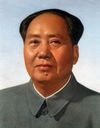
|
ماو زدونگ 毛泽东 (1893–1976) بكين على نطاق واسع |
27 سبتمبر 1954 | 27 أبريل 1959 | 1 | Zhu De | |
| أول رئيس لجمهورية الصين الشعبية. | |||||||
| 2 | 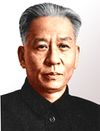
|
ليو شاوچي 刘少奇 (1898–1969) بكني على نطاق واسع |
27 أبريل 1959 | 21 ديسمبر 1964 | 2 | Song Qingling & Dong Biwu (co-serving) | |
| 21 ديسمبر 1964 | 31 أكتوبر 1968 | 3 | |||||
| خلعه ماو زدونگ أثناء الثورة الثقافية. | |||||||
| – |  
|
Song Qingling 宋庆龄 (1893–1981) شنغهاي على نطاق واسع |
Dong Biwu 董必武 (1886–1975) هوبـِيْ على نطاق واسع |
31 أكتوبر 1968 | 24 فبراير 1972 (Song)
17 يناير 1975 (دونگ) |
3 | Vacancy by ascension |
| Both Song Qingling and Dong Biwu co-served as acting chairman of the People's Republic of China until the resignation of Song Qingling on 24 February 1972. Dong Biwu served the remainder of the term. | |||||||
الدستور 1 (1975–1978)
رئيس لجنة التفاهم في الكونگرس الشعبي الوطني؛
- Zhu De (17 يناير 1975 – 6 يوليو 1976) توفى في المنصب
- Song Qingling (6 يوليو 1976 – 5 مارس 1978) بالإنابة
- Ye Jianying (5 مارس 1978 – 5 مارس 1978)
الدستور 3 (1978–1982)
رئيس لجنة التفاهم في الكونگرس الشعبي الوطني؛
- Ye Jianying (5 مارس 1978 – 16 مايو 1981)
؛رئيس فخري لجمهورية الصين الشعبية
| صورة | الاسم (وُلد–توفى) الدائرة الانتخابية |
المنصب | ك.ش.و | نائب الرئيس | ||
|---|---|---|---|---|---|---|
| – | 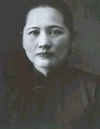
|
Song Qingling 宋庆龄 (1893–1981) شنغهاي على نطاق واسع |
16 مايو 1981 | 28 مايو 1981 | 5 | لم يتأسس المنصب |
| The first and only female Vice-President of the People's Republic of China. Song Qingling is also the first and only Honorary President of the People's Republic of China. | ||||||
رئيس لجنة التفاهم في الكونگرس الشعبي الوطني؛
- Ye Jianying (28 مايو 1981 – 18 يوليو 1983)
الدستور 4 (1982–الآن)
- رئيس جمهورية الصين الشعبية
| صورة | الاسم (وُلد–توفى) الدائرة الانتخابية |
المنصب | ك.ش.و | نائب الرئيس | ||
|---|---|---|---|---|---|---|
| 3 | 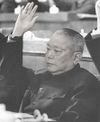
|
Li Xiannian 李先念 (1909–1992) Hubei At-large |
18 يونيو 1983 | 8 أبريل 1988 | 6 | Ulanhu |
| The first President under the 4th Constitution of the People's Republic of China. He started reforms in foreign policy and China began opening to the world. He was first Chinese president who visited USA. He was also the first state president who officially visited North Korea. In 1984, Li met with US President Ronald Reagan during Reagan's visit to China, notably discussing the status of Taiwan with the President. In 1988, Li resigned from his position as President of the People's Republic of China and was replaced by Yang Shangkun. Li was then named Chairman of the National Committee of the CPPCC.[1] | ||||||
| 4 | 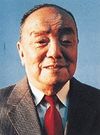
|
Yang Shangkun 杨尚昆 (1907–1998) Sichuan At-large |
8 أبريل 1988 | 27 مارس 1993 | 7 | Wang Zhen |
| The second President under the 4th Constitution of the People's Republic of China. Yang promoted economic reform but opposed political liberalization, a position which Deng Xiaoping eventually came to identify with. Yang reached the height of his political career after the Tiananmen Square protests of 1989, but his organized opposition to Jiang Zemin's leadership led Deng to force Yang to retire. | ||||||
| 5 | 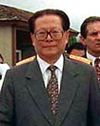
|
Jiang Zemin 江泽民 (1926– ) Shanghai At-large |
27 مارس 1993 | 15 مارس 1998 | 8 | Rong Yiren |
| 15 مارس 1998 | 15 مارس 2003 | IX | Hu Jintao | |||
| Under his leadership, China experienced substantial developmental growth with reforms, saw the peaceful return of Hong Kong from the United Kingdom and Macau from Portugal, and improved its relations with the outside world while the Communist Party maintained its tight control over the government. Jiang has been criticized for being too concerned about his personal image at home, and too conciliatory towards Russia and the United States abroad.[2] Served as Mayor of Shanghai (1985–1989), Chairman of the Central Military Commission of China (1990–2005) | ||||||
| 6 | 
|
Hu Jintao 胡锦涛 (1942– ) Tibet At-large (until 2008) Zhejiang At-large (from 2008) |
15 مارس 2003 | 15 مارس 2008 | 10 | Zeng Qinghong |
| 15 مارس 2008 | 14 March 2013 | 11 | شي جنپنگ | |||
| During his term in office, Hu reintroduced state control in some sectors of the economy that were relaxed by the previous administration, and has been conservative with political reforms.[3] Along with his colleague, Premier Wen Jiabao, Hu presided over nearly a decade of consistent economic growth and development that cemented China as a major world power. He sought to improve socio-economic equality domestically through the Scientific Development Concept, which aimed to build a "Socialist Harmonious Society" that was prosperous and free of social conflict.[4] In foreign policy, Hu advocated for "China's peaceful development", pursuing soft power in international relations and a business-oriented approach to diplomacy. Through Hu's tenure, China's influence in Africa, Latin America, and other developing countries has increased.[5] كان نائب الرئيس (1998–2003) | ||||||
| 7 | 
|
شي جنپنگ 习近平 (1953– ) شنغهاي At-large |
14 مارس 2013 | شاغر | XII | Li Yuanchao |
| الرئيس الخامس حسب الدستور الرابع للصين. كان نائب الرئيس (2008–2013) | ||||||
. . . . . . . . . . . . . . . . . . . . . . . . . . . . . . . . . . . . . . . . . . . . . . . . . . . . . . . . . . . . . . . . . . . . . . . . . . . . . . . . . . . . . . . . . . . . . . . . . . . . . . . . . . . . . . . . . . . . . . . . . . . . . . . . . . . . . . . . . . . . . . . . . . . . . . . . . . . . . . . . . . . . . . . .
انظر أيضاً
المصادر
- ^ Anderson, Kurt (7 May 1984). "History Beckons Again". Time. Retrieved 19 August 2011.
- ^ Tomoyuki Kojima. China's Omnidirectional Diplomacy: Cooperation with all, Emphasis on Major Powers. Asia-Pacific Review, 1469–2937, Volume 8, Issue 2, 2001
- ^ Luard, Tim (11 January 2005). "BBC:China's Leader shows his stripes. 11 January 2005". BBC News. Retrieved 13 March 2010.
- ^ "Kuhn, Robert Lawrence: Hu's Political Philosophies" (PDF). Esnips.com. Retrieved 13 March 2010.
- ^ World Savvy Monitor: China and the World - A foreign policy overview